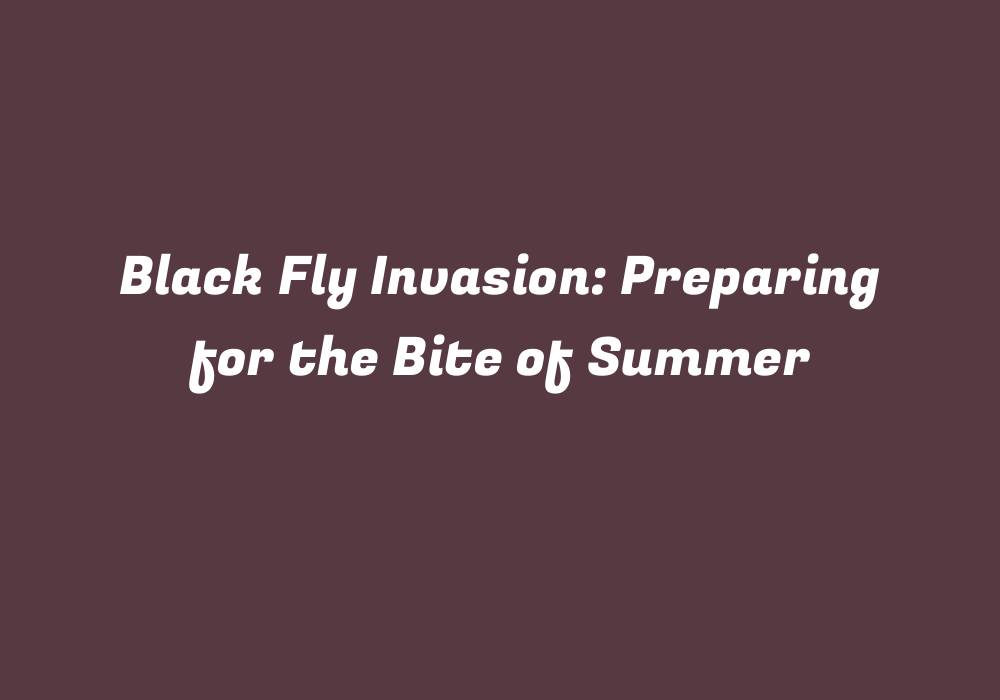Introduction
Summer is the season of fun, relaxation and outdoor activities. As we all look forward to enjoying the warm weather and longer days, it’s also important to remember that certain pests emerge during this time of year. One such nuisance is the black fly, a small insect known for its painful bite. This article discusses some facts about black flies, their behavior, potential health issues they can cause, and practical ways to prepare for and prevent these biting bugs this summer.
Black Fly Basics
Before we dive into preparing for their bite, it’s essential to understand the nature of these insects. Black flies belong to the Simuliidae family and are often found near freshwater sources such as rivers, streams, and lakes. They have a short lifespan of around 20 days, but during this time, they go through four stages – egg, larva, pupa, and adult.
Black fly bites can be quite painful and leave a visible red bump on the skin. They are more likely to bite exposed areas like hands, ankles, and faces. Their saliva contains anesthetics that numb the area during the bite and an anticoagulant that prevents blood clotting. This enables black flies to suck blood for longer periods and causes a painful reaction when the insects are removed.
Potential Health Issues from Black Fly Bites
In addition to causing discomfort, black fly bites can sometimes lead to health concerns. Some individuals may develop allergic reactions due to black fly saliva that trigger an immune system response. In such cases, symptoms could include itchiness, redness or swelling in the affected area and potentially more serious complications if not treated promptly.
Another issue associated with black flies is their ability to transmit diseases through their bites. Some species are known carriers of viruses like West Nile Virus, which can cause severe illnesses in humans if contracted through infected mosquito or black fly bites.
Preparing for Black Fly Season
Now that we have a better understanding of the nature and potential risks posed by black flies, here’s what you can do to prepare for their arrival this summer:
1. Inspect your surroundings
Before the start of the season, check any areas around your home or office where standing water may accumulate. Black fly larvae thrive in such environments and could be a breeding ground for these insects nearby. Eliminate stagnant water sources like birdbaths, garden pots, and buckets to minimize their presence.
2. Protect your skin with repellents
Apply an insect repellent containing DEET, picaridin, or IR3535 on exposed skin to ward off black flies. These chemicals are known for their effectiveness in repelling various types of biting insects, including black flies. Remember to follow the product instructions and reapply as directed for optimal protection throughout the day.
3. Dress appropriately
Wearing long-sleeved shirts, pants, and socks can help minimize your skin’s exposure to black fly bites. Dark colors like khaki or green are particularly effective in blending into natural surroundings and can make it more challenging for these insects to locate you.
4. Use physical barriers
Erecting screens around windows and doors helps prevent black flies from entering your home during the summer months. Additionally, installing fine-mesh window screens on outside windows can keep them out while allowing for a fresh breeze inside.
5. Keep an eye on children and pets
Black fly bites can be especially painful for young children and animals due to their thinner skin or fur. Monitor them closely during outdoor activities to minimize the risk of getting bitten.
6. Utilize fans
Running a fan, either indoors or outdoors, creates a steady airflow that may help deter black flies from biting. These insects are typically attracted to still air and stagnant conditions; therefore, moving air can serve as a natural repellent.
7. Consider using mosquito nets
Mosquito nets can provide an extra layer of protection when sleeping or relaxing outside. They can be hung over beds or picnic tables, creating a barrier against biting insects like black flies while still allowing for airflow.
8. Avoid peak biting times
Black flies are most active during the cooler hours of the day – early mornings and evenings. Limiting your outdoor activities to warmer periods can reduce your exposure to these pests.
Conclusion
While enjoying the beauty and excitement that summer has to offer, it’s crucial to be prepared for the potential nuisance of black flies. By understanding their behavior, recognizing potential health concerns, and employing various prevention strategies, we can better protect ourselves from their bites. With careful planning and preparation, we can make this a memorable and enjoyable summer season without being plagued by pesky black fly annoyances.
